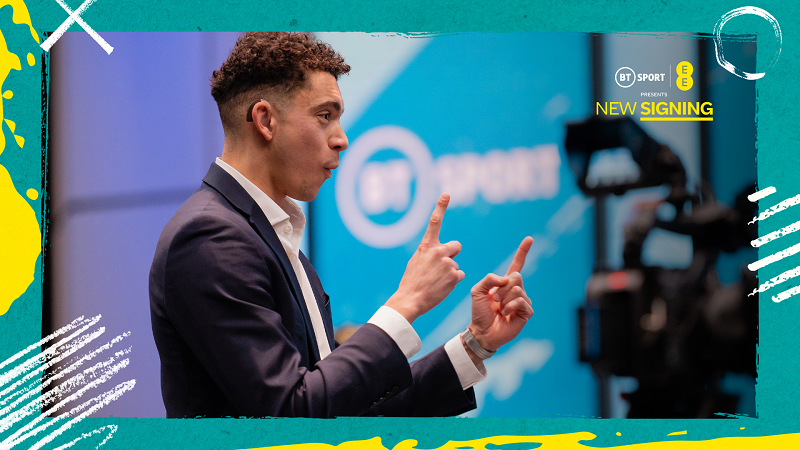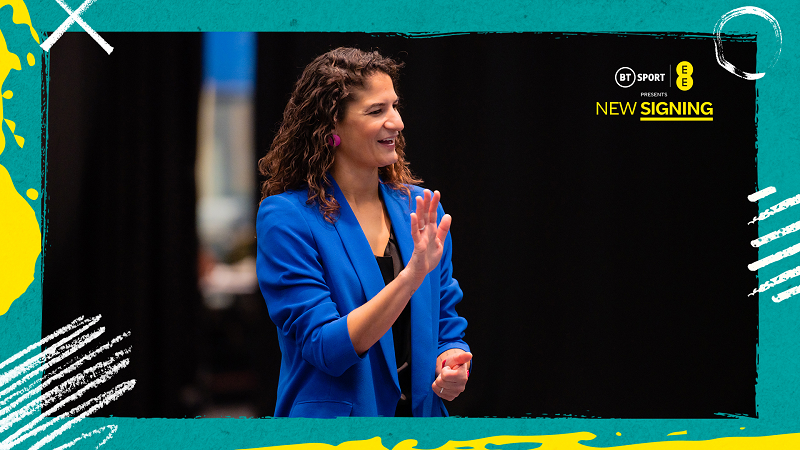The 2023 UEFA Champions League Final will be accompanied by a ground-breakingly accessible broadcast.
In this blog we hear from those involved in creating EE and BT Sport’s innovative ‘New Signing’ campaign: Matt Stevenson (Head of Group Sponsorship at EE), Alex Groom and Issie Mandry (Executive Creative Director and Senior Creative at sport and culture creative agency Cake), and the stars of the project, Damaris Cooke and Rolf Choutan.
Alex: EE’s New Signing campaign is the latest initiative of an extensive body of disability football work from EE and Cake. Since EE became a long-term partner of the Home Nations Football Associations, one of our main focuses has been to grow the disability game on and off the pitch so that football is for everyone. We’ve done some brilliant work together for more than a decade, and this is another project we’re all really excited by.
New Signing is the search for a presenting duo to do something that’s never been done before in football – to provide a dedicated, British Sign Language broadcast for BT Sport football fixtures in 2023, including the UEFA Champions League Final. After a nationwide search for talent, we selected our brilliant pair, who are now going through extensive training with the support of BT Sport, and their journey is being aired as a six-part documentary.
The whole of EE and Cake will be incredibly proud when we see Damaris and Rolf make their TV debut, that’s for sure, and we hope their success goes on to inspire other members of the deaf community to get involved in the game.
1. What was the client brief behind EE ‘The New Signing’ and what were your initial ideas and approach?
Issie: EE’s wider football brief to Cake has always been around finding new ways to open the game up to more people and make it more accessible. To date, we’ve done some amazing work in para and disability football, raising the profile of all the different formats of the game. With this brief we decided to focus on the fans.
Even though there are over 11 million deaf/hard of hearing people in the UK, up until now, there’s never been any British Sign Language (BSL) presence on mainstream football broadcast presenting teams – which is pretty shocking. Of course, there’s subtitles or interpretation, but that’s just not the same as receiving the information first hand, meaning that a huge portion of football fans are currently having a compromised experience of the game.
This, coupled with EE’s connection to BT Sport, made finding their first ever BSL presenters a bit of a no brainer.
2. How did the England players who featured in the promo film respond to the idea?
Issie: The players were really responsive, and genuinely really keen to get it right. They spent a lot of time with our interpreter making sure they had perfected their lines for the promo film. Beyond that, they were really engaged in their conversation with Will and Joe from the England deaf team.
Sometimes, when we shoot these kinds of conversations, we have to chip in with questions and suggestions to keep it flowing, but on this occasion, it was so natural: the players were genuinely interested and wanted to know more. They were even asking Joe and Will to teach them more BSL after the cameras stopped rolling.
3. What made you want to apply/when did you first see the campaign?
Issie: I just wanted to set the context of this question in terms of how New Signing was promoted. We needed this campaign to reach football fans, so creating our promo with members of the England football set-up felt right in terms of the level of star power and profile that we feel this initiative deserves.
Social media and television are very visual mediums, so using EE’s channels and having the promo air during some of BT Sport’s broadcasts also meant that the campaign had the visibility it needed. We were delighted to then have the support of organisations like the Royal Deaf Association and the RNID, who really helped amplify the call out to the deaf community. Now over to Damaris and Rolf!
Damaris: As soon as it went live, my phone was blowing up with the amount of people messaging me and telling me to apply, and then to see England players using BSL, posted by a huge company like EE, showed that this was a serious project and something that I needed to be part of.
Rolf: Seeing England players using BSL just opened my eyes to how great an opportunity this could be for me. It showed me that this is an initiative that deserves attention, and I’m so delighted to be doing it alongside Damaris.

4. How did you make sure the campaign has been designed with the deaf community in mind?
Issie: From the very beginning, this project has always been about collaboration, and the deaf community have been a huge part of that. This campaign is not only about on-screen representation, but ultimately, the improvement of the viewing experience for football fans at home too.
From the inception of the idea through to its execution, it has been a phenomenal learning experience. We have sought to engage with deaf organisations to ensure that all accessibility requirements are met, as well as leaning on the knowledge and support of senior figures in the industry, such as Leslie McGilp, Head of Signing, Access Services at Red Bee Media.
Leslie has been across every step of the journey so far, and a hugely enthusiastic supporter of what EE and BT Sport are aiming to do, and we are extremely grateful for her input.
5. What’s the ambition of the ‘New Signing’ TV Series, following the signers?
Issie: This project is full of firsts. Firsts for Cake, for EE, for BT Sport and for our signers. We knew (and still know) it’s a huge undertaking and there will be so much to learn along the way. We want to take our football audience on that learning journey with us, helping more people understand why accessible sports coverage is so important as well as giving our incredible signers a platform.
Our biggest hope is that we inspire people along the way. Whether that’s inspiring people to learn BSL, inspiring someone from the deaf community to follow their football dreams, or inspiring other sports content creators to make their outputs more accessible. The work doesn’t stop here.
6. How did you get BT Sport on board?
Matt: Owing to EE’s links with BT Sport, it made complete sense to take this idea to them, especially off the back of previous campaigns such as Hope United. Owing to their involvement across the football calendar, and alongside our sponsorships of the Home Nations FAs, we felt that we could really dial up the ambition of the campaign, and hopefully make history along the way.
7. How do you think this work will inspire future campaigns?
Matt: All EE campaigns ladder up to the overall company ambitions and long-term strategy. Using the power of football to support and improve the lives of millions of players, coaches and fans across the UK, EE is responsible for one of the largest ever footballing programmes to run across the UK.
Working with the English, Scottish, Irish and Welsh FAs, we’re helping release the potential grassroots, women’s and disability and para football communities.
Within this, amplifying the status of disability football continues to be an important goal, and we hope that ‘New Signing’ demonstrates our leadership within this field. Sport is a great unifier, and it’s so important to us that every community feels welcome and empowered to try new things, and that we are able to innovate and learn alongside them.
8. What were the biggest challenges you faced in creating the campaign?
Issie: Given the quality of the applications, and the standard on show at the casting day, the final decision was 100% the hardest part. If we could, we would have given all applicants the job!
That said, ‘challenges’ is probably the wrong term to use here. Without wanting to sound very LinkedIn here, each and every part of this initiative has been a valuable learning experience.
It’s to EE and BT Sport’s credit that this campaign is so ambitious, but that ambition must be guided by the deaf community, and most importantly, Rolf and Damaris too, who we see as future stars within sports media. It’s also very important to allow them to enjoy their experiences and learn at their own pace as well.
9. What does this campaign mean for the deaf community? What does this mean to you? What do you think this means for the future of broadcasting?
Rolf: This campaign demonstrates that EE is making a serious effort to bridge the accessibility gap for deaf audiences as well as giving deaf talent the opportunity to play a pivotal role in bridging said gap. For something often described as an ‘invisible disability’ this is fantastic way to make the deaf community feel seen and acknowledged, as well as making the community more visible to hearing audiences.
Damaris: The campaign is important as it means that we (the deaf community) are finally being thought about and our needs are being considered. Access for disabled people has greatly improved over the years but for deaf people, as a minority, we are easily and often overlooked.

This is very personal to me as I am a huge football fan and a big advocate for accessibility. EE and BT Sport’s initiative shows that we are being valued and I hope this is considered to be a seismic moment – not just for us – but also something that will make other networks sit up and take notice, creating a ripple effect that we desperately need.
Already friends who are not football fans have said they will watch BSL broadcasts of games because now the access will be there. That’s saying a lot, converting non-fans to fans!
10. How would you like to impact the future of the football media industry?
Rolf: I want to bring my lived experience, and that of my friends and family, into the conversation so that the key decision makers take into account the passion and requirements of the deaf community.
It will undoubtedly be an iterative process and a two-way one at that – getting feedback from both the broadcasters and media companies as well as the deaf community on what works and what doesn’t, which I hope can then be used to inform other organisations, sports and industries in general.
Damaris: As I said, I hope EE and BT Sport’s campaign will help influence other networks to do the same. There are so many changes that can be easily implemented to make viewing easier for deaf viewers and I hope we will be consulted more as to what makes a positive experience when watching football.
The ripple effect I have mentioned will hopefully trickle into other sports too as there is a huge untapped potential of deaf football and sport fans all over the UK. Once upon a time subtitles were rare on TV but now it’s an everyday thing! I hope BSL access will go the same way and becomes the norm for all sport across all networks.
You can watch Rolf and Damaris kick off their journey to become part of BT Sport’s football coverage in Episode 1 of New Signing live on EE’s YouTube channel here or on BT Sport.

